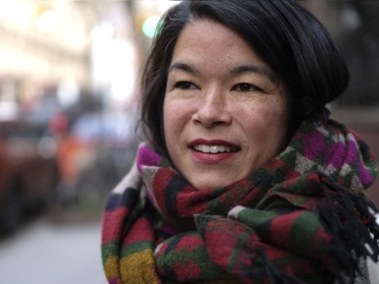In Their Own Words
November 30, 2018
Jennifer Hayashida on “Chronology”


Chronology
Two of the things you see today a girl her
hand her father’s shoulder cherry blossoms
against the subway floor
“Good morning” skates on a lake of
recollection, frozen currents
ring out, nightward
Gravel sprays alliterative
music. Inheritance of hand-me-downs
moss, turpentine, flamenco-dancing-doll-as-souvenir
You are three and considered lost
You know full well where you are
A dream is a scene slipping seaward
noisy sleeper: all you have is the sound, the shore
there there
Two of the things you see today a look
his sad glance against the window
branches from a tree bent against travelers
This, a line along the lake, line
slung like telephone wire, caesurae
where wayward currents divert into
a sudden vertical tug and each line subtracts
On “Chronology”
There is a story from when I was a small child and lived in Oakland, California, the city where I was born. One day, according to my mother, I disappeared, and my parents searched for me everywhere, inside the house and in the surrounding neighborhood. Supposedly, they searched for hours. They eventually found me sitting in a walk-in closet, behind some piece of furniture. I now have children of my own, and often wonder about a child’s ability to remain still and quiet for so long.
My own ability to recall my childhood has always felt compromised, like a machine full of static or fried circuits. I know that I got here, but I’m never quite sure how. I wanted to try to let the poem work mimetically rather than through any kind of narrative about childhood and memory, to use it to analyze and understand this chronic sensation of not knowing. In the arc of the book, this poem is also a bridge, or interlude, between two pieces where form and time are being negotiated.
“Chronology,” then, is an attempt to represent not the memory, but that sensation of always re-booting, since every day there is something that surfaces and recedes, be it an image from the past or, here, strangers and branches of cherry blossoms: markers of the ever-receding here and now. I experience the poem – stretched out, vertical, elastic – as an ideal container for my experience of this chronic loss, that sensation of lurching through the past, present, and future, how each line can simultaneously pull you close and push you away.
More In Their Own Words

Emily Sieu Liebowitz on “I Am Always Leaving to Gather the News”
The title is taken from an Andre Breton poem, and I've sat with that line for a long time. The poem is in some ways a response to that line, an examination of the individual and the collective, and how events, lives, and people turn into news, history, and narrative.
Read Article
Joseph O. Legaspi on “This Town, Empty Nest”
A poet, at times, is the last person to know or to know how to talk about his poems. So, it starts often with the declarative for me, an insistence. With this poem it is a banishment: there are no children here. What a lonesome, futureless place of absence and ghostly laughter.
Read Article